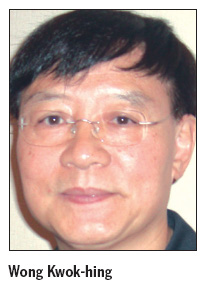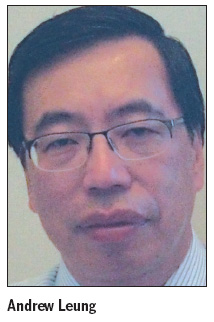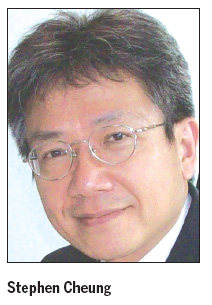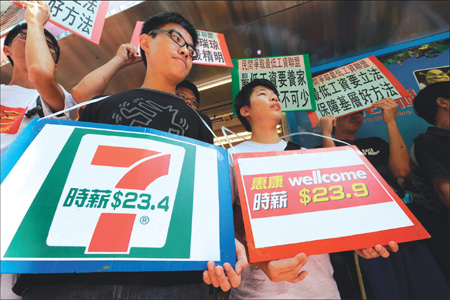The minimum wage debate
Updated: 2010-07-14 07:41
By Joseph Li(HK Edition)
|
|||||||||
|
Members from the People's Alliance for Minimum Wage protest outside a supermarket in Hong Kong on July 12. The demonstrators are pushing for a minimum wage in the city where convenience store retailers are paying staff as little as HK$23 ($3) per hour. Mike Clarke / AFP |
Hong Kong soon will have a minimum wage law. The Legislative Council resumes debate and is scheduled to vote on the controversial minimum wage bill beginning today. But the real battle begins with the computation of the initial rate and the subsequent wage level adjustments. Joseph Li explores the issue from the perspective of employers, workers, academics and government.
In terms of emotional heat and public controversy, the debate over the minimum wage for Hong Kong lags not far behind political reform. On the one hand workers are demanding the right to earn enough to support families and enjoy the benefits of living in Hong Kong and on the other hand the employers say they cannot sustain demands for a high minimum wage without laying off huge numbers of employees.
The voices of the workers

"We are insisting on a statutory minimum wage rate of HK$33 per hour when the Provisional Minimum Wage Commission (PMWC) announces the initial wage rate at the end of this month," Wong Kwok-hing, a lawmaker who represents the Hong Kong Federation of Trade Unions (FTU), told China Daily. To him the debate represents the beginning of a breakthrough by employees against a long enduring wall of opposition from the business sector.
The hourly rate of HK$33 was proposed by the FTU based on research, showing that a monthly income of about HK$7,000 (based on eight hours per day and 26 days per month) will support the basic living expenses of a family.
The minimum wage, Wong says, aims to protect those who are least able to protect themselves. He rejects counterclaims from employers that the HK$33 minimum will affect the labor market. He adds that minimum wage laws have been implemented in many countries including the Chinese mainland.
After rounds of discussions at the LegCo bills committee, it has not been agreed that how often the minimum wage level will be subject to a review. At first the government undertook to review wages from time to time, but many legislators proposed an annual review. Later the government made a two-year concession.
Wong said the FTU has been pressing for a statutory minimum wage for nearly a decade. Since the dissolution of two municipal councils in the year 2000, an enormous volume of cleaning and security work, previously undertaken by the councils was outsourced to private companies. That gave rise to numerous problems. There have been wage cuts for workers, default on payment of salaries and wages, protracted working hours and significant adverse effects on the well-being of working families. The situation ultimately has aggravated the poverty situation in Hong Kong, Wong says.
"Perhaps the government has realized the growing poverty problem," Wong said. "In the absence of a minimum wage, more low-income people will be forced to apply for social security," said Wong.
The FTU's call for a minimum wage created little resonance in the community at large during the early years of the campaign, Wong recalled. The turning point came in 2005 when Donald Tsang, then a candidate for Chief Executive, approached the three lawmakers of the FTU, and committed to support the minimum wage in exchange for their agreement to support him.
Tsang has honored his election pledge. Initially the government did nothing more than to launch a voluntary wage protection campaign. It extended over two years and covered only cleaning and security workers.
The effort never was deemed successful. The government at last conceded that legislation protecting all employment sectors was needed. A bill was brought before the LegCo in June 2009 following rounds of public consultation and discussion.
Wong does not oppose the bill's intent to exempt domestic employees from the protection of the minimum wage law (because they receive a monthly pay and are provided accommodation and meals by their employers). He is also satisfied that disabled employees will undergo an appraisal that determines if they merit the minimum wage or a lower wage.
It's been a long battle, he says, and he is relieved to see the hotly debated minimum wage on the verge of coming to fruition.
This is only the first round, Wong hastens to say. Once the minimum wage is settled, the FTU intends to go after the issue of working hours. When the next round of labor legislation is debated the FTU wants to affect the implementation of standard working hours.
What the employers say

Legislator Andrew Leung, who speaks in support of the interests of the business sector, cautions that a minimum wage set beyond what employers can bear risks exacerbating unemployment in Hong Kong and undermining Hong Kong's competitive edge.
He voices particular concern for small and medium enterprises if a heavy financial burden is imposed on them. Leung points to the fast food chain Cafe de Coral, which recently issued a profit alert in the face of the impending minimum wage legislation.
"Businessmen believe in the free market that determines wages," he said. "We opposed the minimum wage but there was little we could do once the government decided to go ahead. If we opposed too much, we would be blamed as 'unscrupulous employers' by the unions.
"The trade unions insisted on an hourly rate of HK$33 to support the living of a family but the government said the law would only pay a wage at the lower limit because there exists also the social security safety net. In our view, it should not be too high initially, because it will be very difficult to lower it in times of economic hardship. If the minimum wage does not cause a surge in unemployment or affect our competitiveness, we may increase the wage level step by step."
Leung also injects a concern for older workers. If the minimum wage level is too high, he says, certain employers will hire fewer staff, or take on only younger, abler workers and shun older workers.
For example, owners of single-storey buildings may cease hiring watchmen if the monthly wage is raised to about HK$7,000, he said. Manpower in cases such as that is likely to be replaced by closed-circuit television, or steel gates. Similarly, catering outlets will employ fewer cleaning workers and use dish-washing machines instead.
"If that happens, the people who we want to protect will, unfortunately, lose the protection," he warned. "The minimum wage will affect the catering, retail, tourism and logistics sectors most. If operating costs increase, the enterprises most likely will raise prices and it is ultimately consumers that will foot the bill."
Leung notes the statutory minimum wage is not applicable to domestic helpers and interns. However, he said the law should also exempt young people, given their lack of working experience. Since the minimum wage bill does apply to young people, he fears employers will be reluctant to hire those who have no working experience, which is another potential contributor to higher unemployment.
The academic view

Stephen Cheung, Chair Professor and Dean of the Baptist University's School of Business, points out that the minimum wage is not only an economic issue but also a political issue. Owing to deteriorating conditions contributing to a vast wage disparity in Hong Kong, the government cannot turn a blind eye to the problem by using "market economy" as an excuse not to implement the minimum wage, he said.
"Even the UK and the Chinese mainland have implemented the minimum wage," he notes.
Over the past 13 years, said Cheung, the per capita GDP has grown by 30 percent, yet the medium household income has remained the same, meaning that people at the lower reach of society have not benefited from the fruits of economic development.
"It is the government's duty to take care of disadvantaged people who need care, including the elderly, disabled and the low income group," he commented. "The pure economic theory may not work now and the government must intervene. If it does not intervene, it may as well stop paying social security or providing public housing to people in need."
Cheung reckons that the minimum wage can motivate people to find work and rely on themselves. However, some underprivileged workers say that older employees (e.g., watchmen) may lose their jobs because employers would rather hire younger, quicker and abler employees at the same wage level.
Even the younger job seekers face strong competition because the employers would pick only the best candidates and pay them the statutory minimum wage.
He said the minimum wage will impose a heavy burden on employers if it is too high. On the other hand if the minimum is set too low it will not protect the workers.
"Whatever the wage level, it is essential for the government to set up a fair, reasonable, transparent, flexible wage adjustment mechanism which is acceptable to both the employers and employees," he suggested.
What the government says
The minimum wage is intended to devise an optimal statutory regime to forestall excessively low wages. The intent however is also to avoid affecting labor market flexibility, economic growth and competitiveness or to set off a significant loss of low-paid jobs, said a spokesperson for the Labour and Welfare Bureau.
The PMWC will adopt an evidence-based approach to making its recommendation for the initial minimum wage. That evidence will include data research and analysis, as well as extensive consultation with stakeholders.
The initial minimum wage level will be established in the form of subsidiary legislation once the principal minimum wage bill has passed. The PMWC will recommend a rate to the Chief Executive. That rate is subject to approval of the LegCo, which may approve or reject it, but legislators will not have authority to amend it. If the minimum wage rate that will go before legislators is rejected, the proposed statutory minimum wage rate then would be left hanging in limbo.
(HK Edition 07/14/2010 page2)
